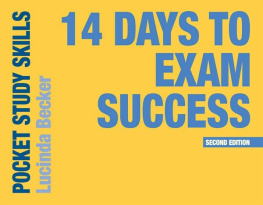The Publishers would like to thank the following for permission to reproduce copyright material.
Photo credits
P. taken from Greenfoot software.
Acknowledgements
Every effort has been made to trace all copyright holders, but if any have been inadvertently overlooked, the Publishers will be pleased to make the necessary arrangements at the first opportunity.
Although every effort has been made to ensure that website addresses are correct at time of going to press, Hodder Education cannot be held responsible for the content of any website mentioned in this book. It is sometimes possible to find a relocated web page by typing in the address of the home page for a website in the URL window of your browser.
Hachette UKs policy is to use papers that are natural, renewable and recyclable products and made from wood grown in sustainable forests. The logging and manufacturing processes are expected to conform to the environmental regulations of the country of origin.
Orders: please contact Bookpoint Ltd, 130 Park Drive, Milton Park, Abingdon, Oxon OX14 4SE. Telephone: (44) 01235 827720. Fax: (44) 01235 400401. Email
ISBN: 978 1 5104 5493 4
eISBN: 978 1 5104 5505 4
Ian Paget, Robert Wicks
First published in 2018 by
Hodder Education,
An Hachette UK Company
Carmelite House
50 Victoria Embankment
London EC4Y 0DZ
www.hoddereducation.co.uk
Impression number 10 9 8 7 6 5 4 3 2 1
Year 2023 2022 2021 2020 2019
All rights reserved. Apart from any use permitted under UK copyright law, no part of this publication may be reproduced or transmitted in any form or by any means, electronic or mechanical, including photocopying and recording, or held within any information storage and retrieval system, without permission in writing from the publisher or under licence from the Copyright Licensing Agency Limited. Further details of such licences (for reprographic reproduction) may be obtained from the Copyright Licensing Agency Limited, www.cla.co.uk
Cover photo 2017 Andrew Ostrovsky
Typeset in Bembo Std Regular 11/13pt by Aptara Inc.
Printed in Spain
A catalogue record for this title is available from the British Library.
Get the most from this book
Everyone has to decide his or her own revision strategy, but it is essential to review your work, learn it and test your understanding. These Revision Notes will help you to do that in a planned way, topic by topic. Use this book as the cornerstone of your revision and dont hesitate to write in it personalise your notes and check your progress by ticking off each section as you revise.
Track your progress
Use the revision planner on pages to plan your revision, topic by topic. Make a note when you have
revised and understood a topic
tested yourself
practised the exam questions and gone online to check your answers and complete the quick quizzes
You can also keep track of your revision by noting each topic heading in the book. You may find it helpful to add your own notes as you work through each topic.
Features to help you succeed
Key terms
A number of key terms are used and defined for you as you work through this guide. Make sure you learn them so that you can use the terms accurately and precisely in the exams in order to gain top marks. A glossary of programming terms can be found on page .
Exam tips
Exam tips are given throughout the book to help you polish your exam technique in order to maximise your chances in the exam.
Now test yourself
These short, knowledge-based questions are the first step in testing your learning. Answers are available online.
Countdown to my exams
68 weeks to go
Start by looking at the specification make sure you know exactly what material you need to revise and the style of the examination. Use the revision planner on pages to familiarise yourself with the topics.
Organise your notes, making sure you have covered everything on the specification. The revision planner will help you to group your notes into topics.
Work out a realistic revision plan that will allow you time for relaxation. Set aside days and times for all the subjects that you need to study, and stick to your timetable.
Set yourself sensible targets. Break your revision down into focused sessions of around 40 minutes, divided by breaks. These Revision Notes organise the basic facts into short, memorable sections to make revising easier.
26 weeks to go
Read through the relevant sections of this book and refer to the exam tips, exam summaries, typical mistakes and key terms. Tick off the topics as you feel confident about them. Highlight those topics you find difficult and look at them again in detail.
Test your understanding of each topic by working through the Now test yourself questions in the book. Look up the answers at the back of the book.
Make a note of any problem areas as you revise, and ask your teacher to go over these in class.
Look at past papers. They are one of the best ways to revise and practise your exam skills. Write or prepare planned answers to the exam practice questions provided in this book.
Use the revision activities to try out different revision methods. For example, you can make notes using mind maps, spider diagrams or flash cards.
Track your progress using the revision planner and give yourself a reward when you have achieved your target.













